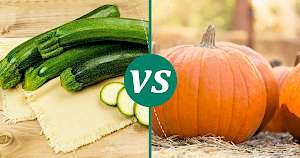Pumpkin vs Zucchini: Calories & Nutrition Showdown


Pumpkin vs Zucchini
Nutrition Facts
Serving size:
change
5g10g15g20g30g40g50g60g80g100g120g140g160g180g200g220g250g300g350g400g450g500g600g700g800g900g1000g
1oz2oz3oz4oz5oz6oz7oz8oz10oz12oz15oz20oz25oz30oz35oz40oz50oz
Amount Per Serving:
Serving size:
change
5g10g15g20g30g40g50g60g80g100g120g140g160g180g200g220g250g300g350g400g450g500g600g700g800g900g1000g
1oz2oz3oz4oz5oz6oz7oz8oz10oz12oz15oz20oz25oz30oz35oz40oz50oz
Amount Per Serving:
Pumpkin vs Zucchini 100g Compare
| per 100g | Pumpkin | Zucchini |
|---|---|---|
| Calories | 26 | 17 |
| Carbohydrates | 6.5 g | 3.11 g |
| Fat | 0.1 g | 0.32 g |
| Dietary fiber | 0.5 g | 1 g |
| Protein | 1 g | 1.21 g |
| Calcium | 21 mg | 16 mg |
| Iron | 0.8 mg | 0.37 mg |
| Magnessium | 12 mg | 18 mg |
| Phosphorus | 44 mg | 38 mg |
| Potassium | 340 mg | 261 mg |
| Sodium | 1 mg | 8 mg |
| Zink | 0.32 mg | 0.32 mg |
| Vitaminium A | 7384 µg | 200 µg |
| Vitaminium B1 (Thiamine) | 0.05 mg | 0.045 mg |
| Vitaminium B2 (riboflavin) | 0.11 mg | 0.094 mg |
| Vitaminium B3 (Niacin) | 0.6 mg | 0.451 mg |
| Vitaminium B5 | 0.298 mg | 0.204 mg |
| Vitaminium B6 | 0.061 mg | 0.163 mg |
| Vitaminium B9 (Folic acid) | 16 mg | 24 mg |
| Vitaminium C | 9 mg | 17.9 mg |
| Vitaminium E | 1.06 mg | 0.12 mg |
| Vitaminium K | 1.1 µg | 4.3 µg |
| Beta karoten | 3100 mg | 120 mg |
When it comes to the colorful world of vegetables, pumpkin and zucchini hold their unique spots - not just on our plates but also in our hearts. These versatile veggies can transform into both savory and sweet dishes, making them favorites among chefs and home cooks alike. Beyond their culinary flexibility, pumpkin and zucchini are packed with nutrients, making them a healthy addition to any diet. But how do they compare in terms of calories, nutrition, and more? Let's dive into the fascinating details of pumpkin vs. zucchini.
Introduction to Pumpkin and Zucchini
Before we compare them head-to-head, let's explore some interesting facts about these vegetables. Pumpkins are often associated with fall and are a staple in holiday dishes such as pies and soups. They belong to the squash family and are native to North America. Pumpkins are not only delicious but also a symbol of celebration during Halloween and Thanksgiving.
Zucchini, on the other hand, is a summer squash that can grow to almost a meter in length but is usually harvested when still immature. Although zucchini is treated as a vegetable in the culinary world, it is technically a fruit. Originating in the Americas, zucchini has become a popular ingredient around the world, known for its versatility in dishes from zoodles (zucchini noodles) to cakes.
Nutritional Face-Off
When considering pumpkin vs. zucchini, particularly in terms of nutrition, both vegetables are low in calories but rich in vitamins and minerals. Here's a closer look at their nutritional profiles per 100g serving:
- Calories: Pumpkin has 26 calories, while zucchini has only 17 calories.
- Carbohydrates: Pumpkins contain 6.5g of carbs, and zucchinis have 3.11g.
- Fiber: Zucchini leads with 1g of fiber, compared to pumpkin's 0.5g.
- Fat: Zucchini contains slightly more fat at 0.32g, with pumpkin at 0.1g.
- Protein: Zucchini also has a slight edge in protein content, with 1.21g to pumpkin's 1g.
Both vegetables are excellent sources of vitamins and minerals, including Vitamin A, with pumpkin providing a whopping 7384 IU compared to zucchini's 200 IU. Zucchini, however, offers more Vitamin C, potassium, and magnesium. Interestingly, both have zero cholesterol and are gluten-free, making them great options for various dietary needs.
What Does This Mean for Your Diet?
Choosing between pumpkin and zucchini depends on your dietary goals. If you're looking for lower calories and carbs, zucchini might be the better choice. However, if you're after a boost in Vitamin A and beta-carotene, pumpkin is the way to go. Both vegetables are incredibly versatile and can be used in numerous recipes ranging from baked goods to hearty stews.
Ultimately, both pumpkin and zucchini offer unique flavors and nutritional benefits that make them worthy additions to your meals. Whether you're carving a pumpkin for Halloween, baking a loaf of zucchini bread, or simply sautéing some veggies for dinner, you're not just adding color and texture to your dish but also packing it with essential nutrients.
So, the next time you're pondering pumpkin vs. zucchini, remember that each has its own set of benefits. Why not incorporate both into your diet and enjoy the best of both worlds? After all, variety is not just the spice of life but also the key to a balanced and nutritious diet.
Pumpkin 100g
26kcalCalories source
- 84% CARBS.
- 13% PROTEIN
- 3% FAT
Zucchini 100g
17kcalCalories source
- 62% CARBS
- 24% PROTEIN
- 14% FAT
Compares of pumpkin
- Pumpkin vs Asparagus
- Pumpkin vs Bamboo Shoots
- Pumpkin vs Beetroot
- Pumpkin vs Pepper
- Pumpkin vs Bitter Melon
- Pumpkin vs Calabash
- see all compares of pumpkin
Marcin Piotrowicz
calories-info.com creator
Healthy diet and healthy lifestyle promoter
Add comment